Best beginner classical guitars 2025: Plus the top Spanish guitar for beginners
Our expert round-up of the best classical guitars for beginners, with amazing budget nylon offerings from brands including Yamaha, Cordoba, Takamine and Epiphone
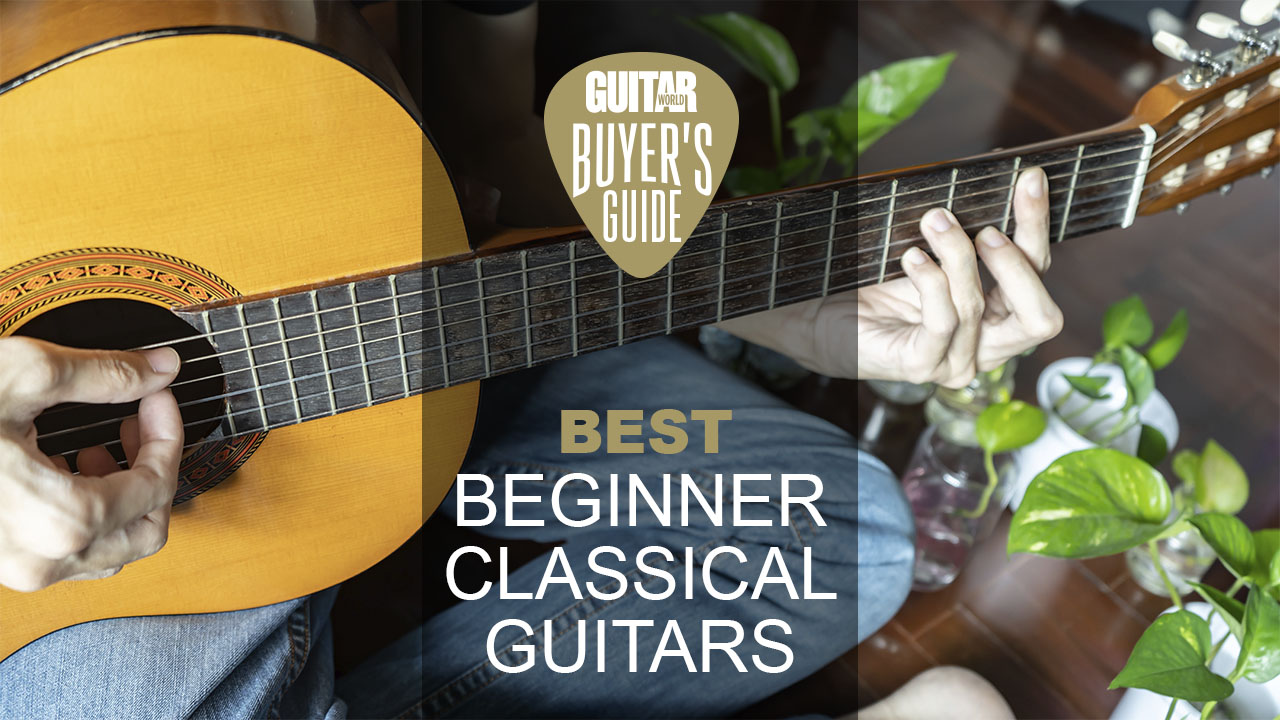
Gone are the days of terrible starter guitars with mile-high action and terrible intonation. Now, the best beginner classical guitars offer players the mellow sound and softer touch of nylon strings with the promise of reliability, a good sound and quality construction.
While those old beat-up, hard to play guitars are still out there (cue flashbacks to my first few guitar lessons), more and more manufacturers are producing good quality nylon-string guitars at an affordable price point. The best beginner classical guitars are going to be nice and playable for those just starting out, and essentially provide a really good fundamental starting point.
There are many reasons why beginners tend to favor classical guitars, which we’ll outline later on. But regardless of the guitar type, you need to know you’re learning on an instrument you can trust, that plays well, and which sounds great. Every instrument featured in this guide fits that bill.
Whether you’re teaching yourself, studying via online lessons, or seeing a tutor, starting off with one of the best beginner classical guitars will ensure you’ve got a quality instrument that will allow you to progress, instead of prohibiting you.
Best beginner classical guitars: Guitar World’s choice
When you’re choosing a beginner classical guitar, you essentially want three things. A guitar easy to get to grips with, that sounds good, and one that won’t fall apart.
In terms of sound, playability and price, we’ve picked the Yamaha C40II as the best beginner classical guitar. It has been designed with those just starting out in mind and is nice and easy to play. It’s got a good tone, and it doesn’t break the bank.
If you’re wanting to venture into more Spanish, flamenco or gypsy jazz territory, then we like the Cordoba C5. It’s a touch brighter and will give you a nice snappy tone that will react nicely to percussive playing styles.
Best beginner classical guitars: Product guide
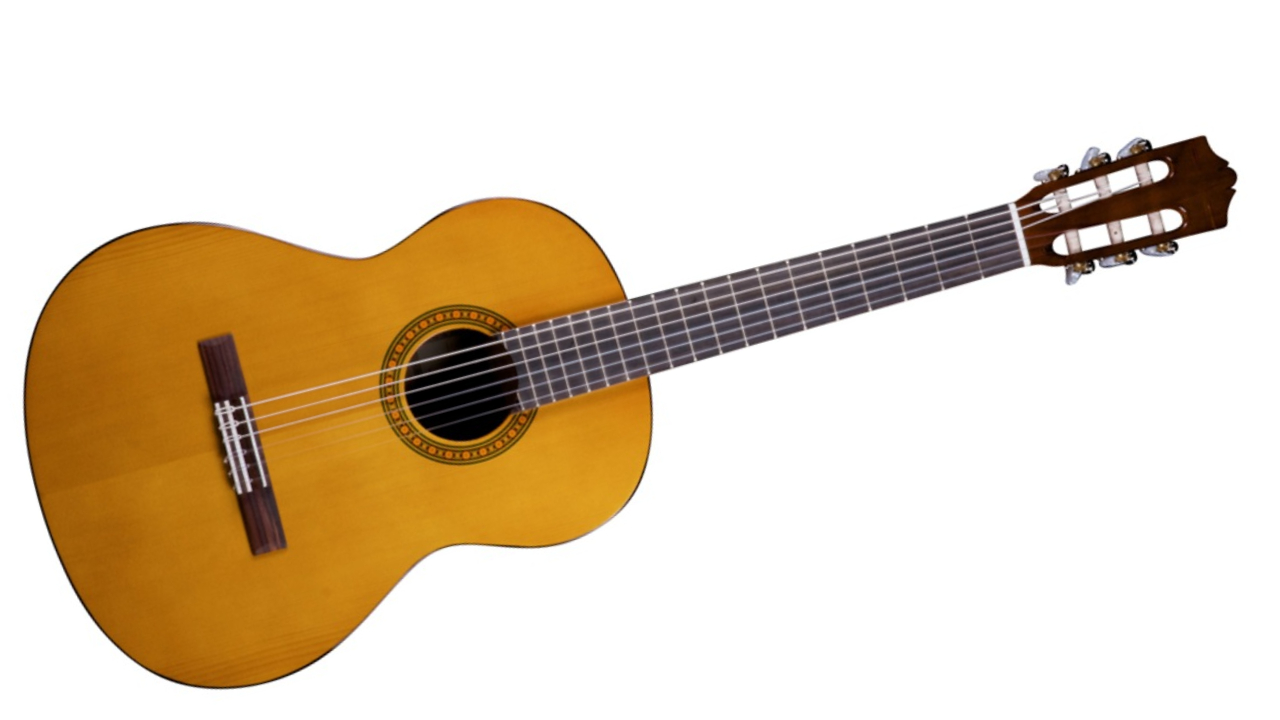
1. Yamaha C40II
Our expert review:
Specifications
Reasons to buy
Reasons to avoid
Choosing from among the best beginners classical guitars can be hard, especially knowing how to get value for money if you’re unsure how much time you can put into learning. The Yamaha C40II is almost perfect for anyone looking to invest in a decent quality beginner’s classic guitar without breaking the bank.
The Yamaha C40II is light, comfortable to play and sounds great, making it ideal for anyone looking to learn the guitar without overextending their finances at an early stage. It rewards regular playing and will ensure your guitar journey starts out on the right foot.
Plenty of players choose Yamaha guitars to learn on, and the C40II beginner’s classical guitar is a great example of why that reputation still stands true today.
Read our full Yamaha C40II review
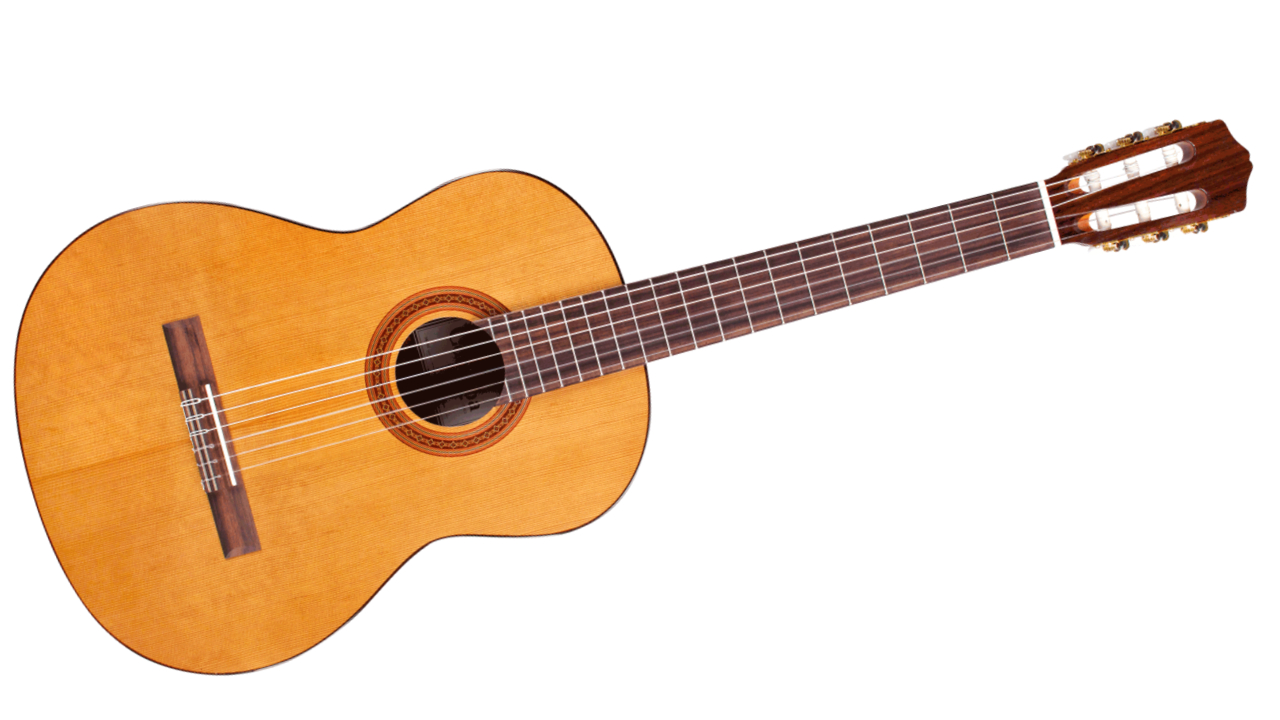
2. Cordoba C5
Our expert review:
Specifications
Reasons to buy
Reasons to avoid
Not every nylon strung acoustic is designed for playing whimsical medieval ballads on. The Cordoba C5 is geared entirely towards Spanish styles, like flamenco and gipsy jazz, and has a few neat design touches to support this. The choice for fan-bracing inside the guitar provides strength but also can deliver a brighter, more attack-heavy sound, which is perfect for more percussive playing styles.
There are some pleasing aesthetic points to the Cordoba C5 too, like the gold tuners, which when combined with the guitar’s great build and superb tonality make for a pretty compelling argument for one of the best beginner’s classical guitars.
The C5 is also available with a solid spruce top, instead of the standard cedar. This produces an extra hint of brightness, enabling the crisp treble of this instrument to shine through.
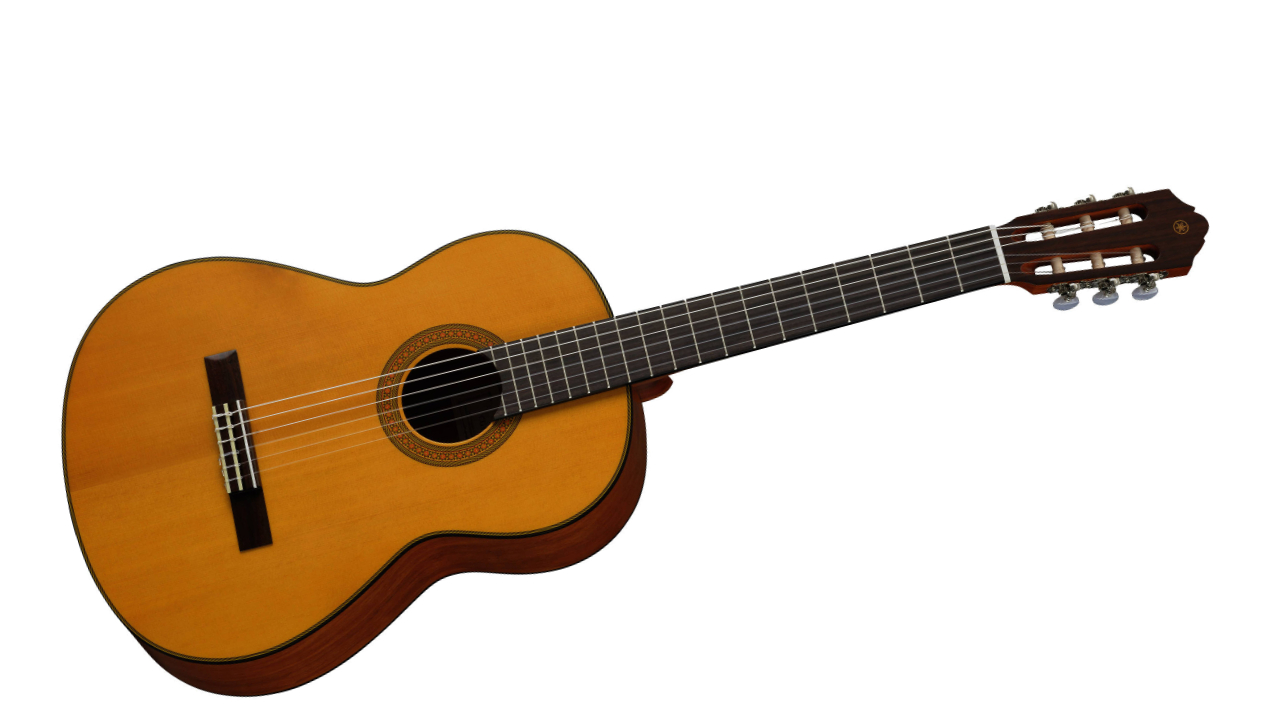
3. Yamaha CG122MSH
Our expert review:
Specifications
Reasons to buy
Reasons to avoid
As a ‘proper’ nylon strung beginner’s classical guitar, they don’t come much better than the Yamaha CG122MSH. While it may look like a regular cheapo guitar, the difference when it comes to tone, build quality and playability is night and day.
The solid Engelmann spruce top gives the tone a depth and richness which sounds amazing, while the full 2-inch nut width gives you the proper classical playing experience. There’s a lot to like about this beginner classical guitar.
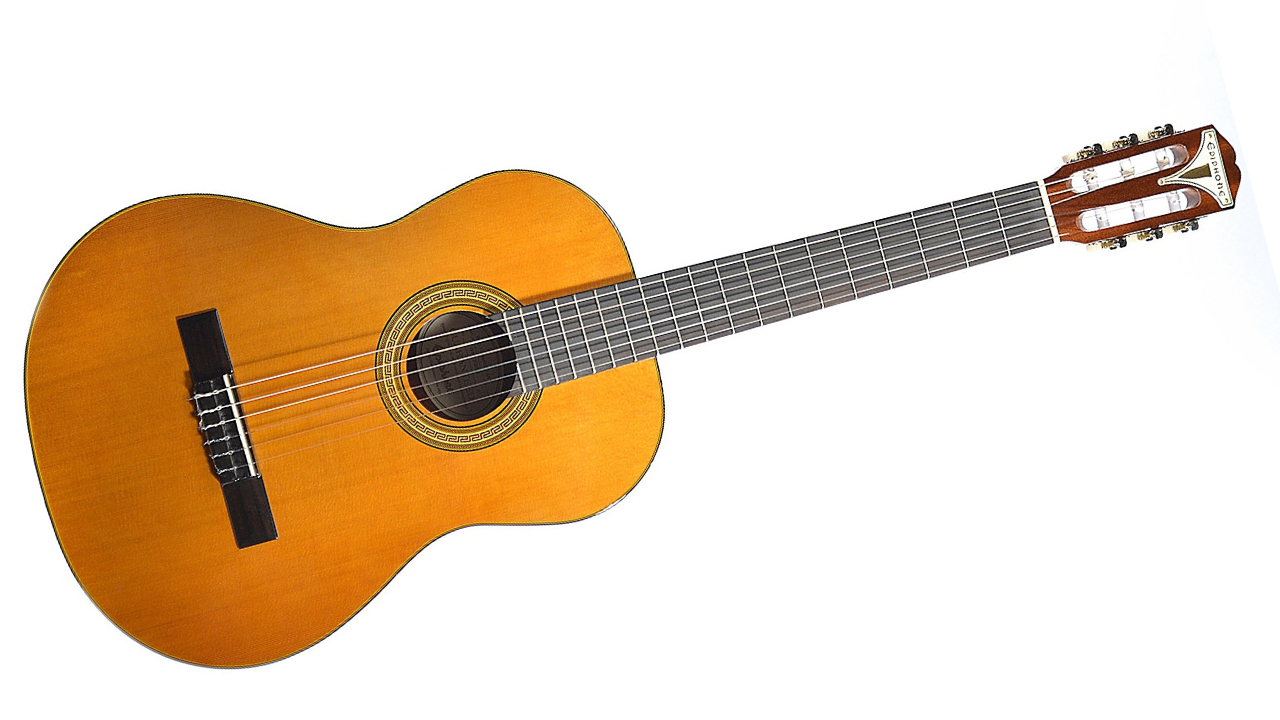
4. Epiphone PRO-1 Classic
Our expert review:
Specifications
Reasons to buy
Reasons to avoid
Despite being more famous for its iconic electric and steel-string acoustics, Epiphone has dipped its toe in the classical waters with the PRO-1. Clearly aimed at getting younger players hooked on the Epiphone brand, the Epiphone PRO-1 Classic is designed to be incredibly simple to play.
You won’t find fancy fixtures and fittings here, but as an inexpensive first step on the ladder, this is one of the best beginner’s classical guitars for smaller hands in particular. Buy it and don’t look back.
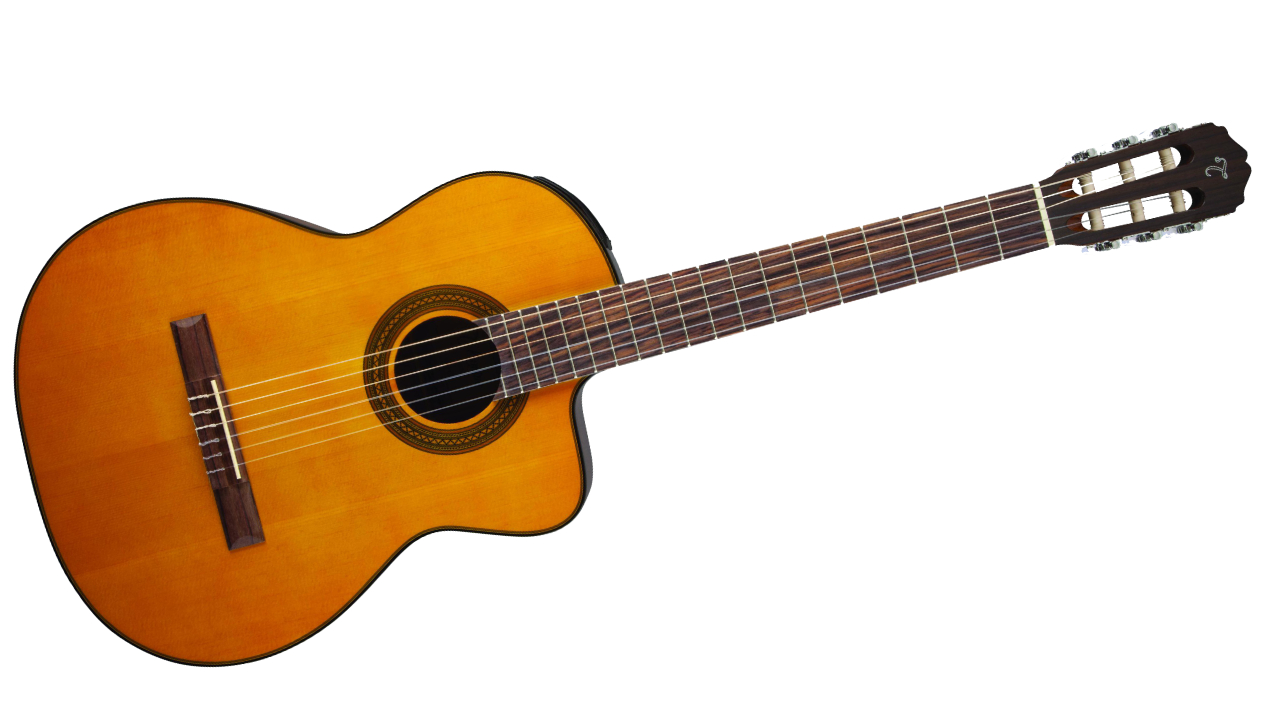
5. Takamine GC1CE
Our expert review:
Specifications
Reasons to buy
Reasons to avoid
For those of you now find yourself above the level of ‘total beginner’, and want something a bit more fully featured to aid your progression, the Takamine GC1CE might just be the best beginner’s classical guitar for you out of all the instruments featured here. This superb quality electro acoustic classical guitar boasts a level of tone and build quality way above the basic beginner models.
You also gain the ability to play plugged in, making the Takamine GC1CE viable for gigs and performances. It is a little more expensive than most of the others on this list, but the leap in quality and reliability makes the GC1CE a guitar you won’t grow out of any time soon.
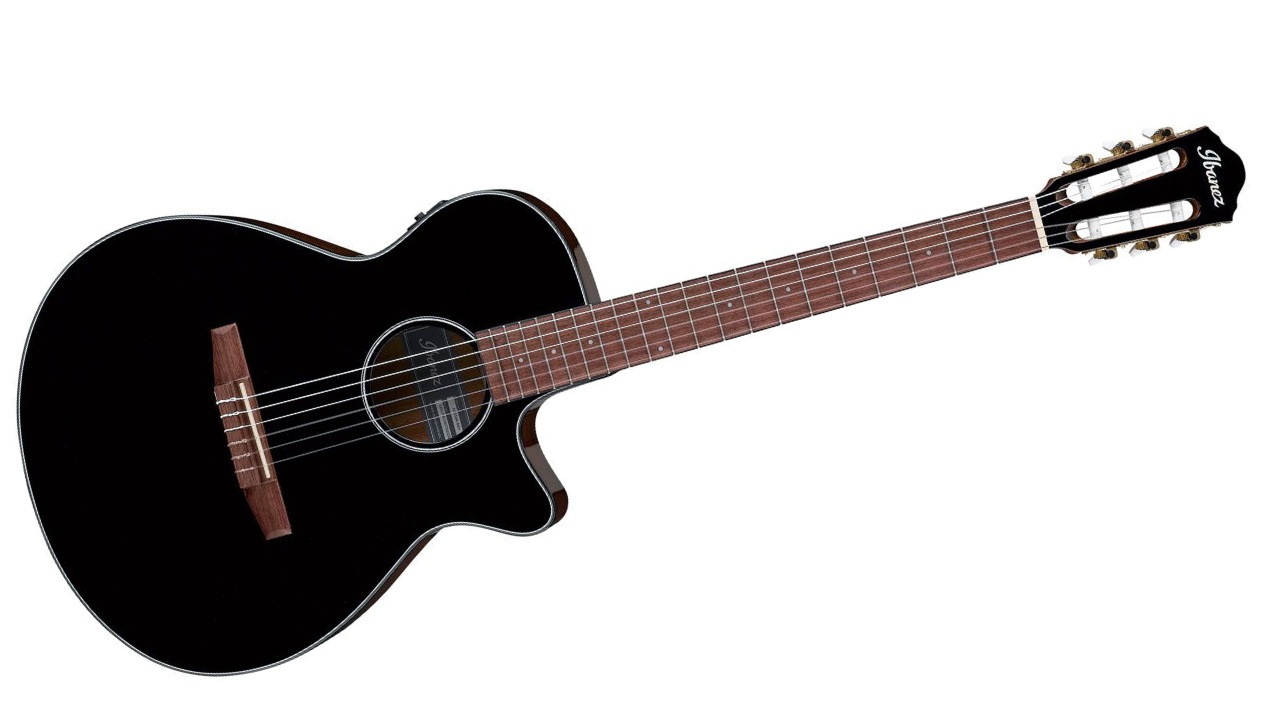
6. Ibanez AEG50N
Our expert review:
Specifications
Reasons to buy
Reasons to avoid
Not every nylon string player wants the traditional shape and finish seen on almost every guitar in the category. The Ibanez AEG50N caters for this crowd by providing everything nylon players love – wide fingerboards, clean tones – with a more modern visual aesthetic.
The Ibanez AEG body shape is slightly shallower than a standard beginner’s classical guitar, meaning it may appeal more to electric players as a second guitar. That classic Ibanez style and quality is evident throughout here, too.
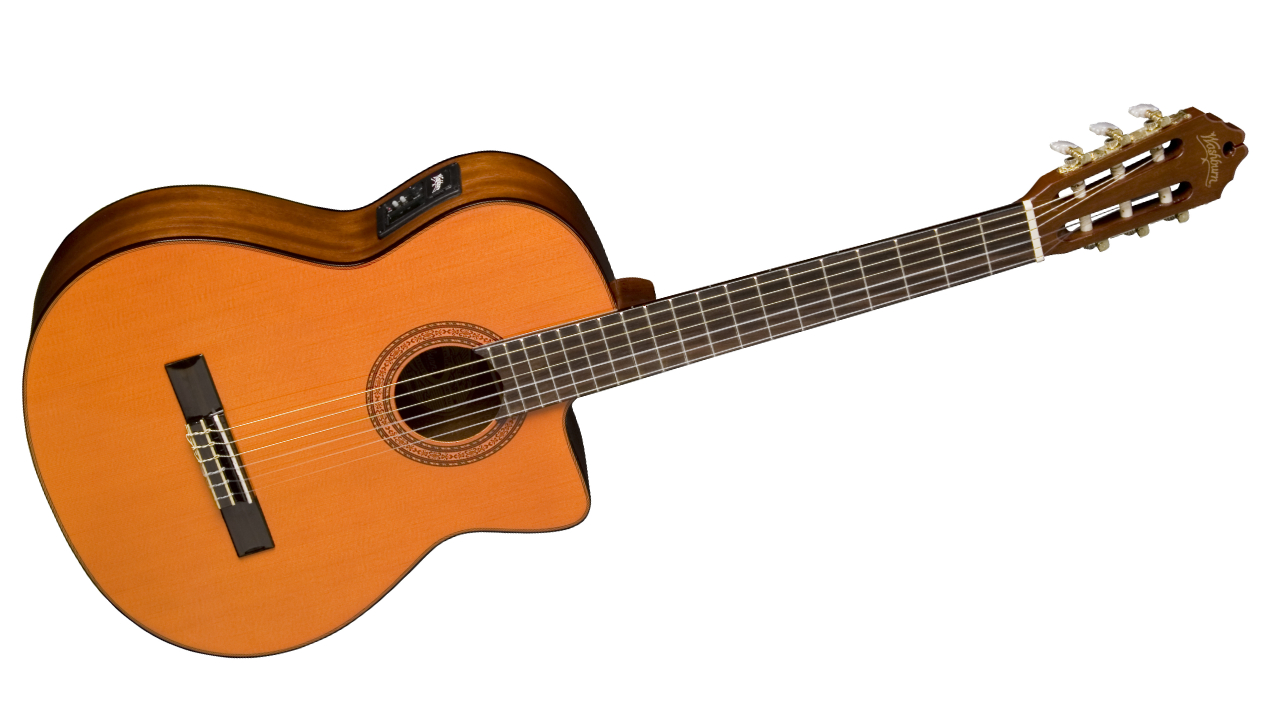
7. Washburn C5CE
Our expert review:
Specifications
Reasons to buy
Reasons to avoid
Washburn is a well-respected brand, particularly in the world of acoustics, so the Washburn C5CE comes with a certain assurance of quality. The C5CE is a solid, entry-level electro-acoustic with everything you’d expect from a beginner’s classical guitar, including a wide nut and spruce top, producing a mellow, warm sound.
We’ve heard from players who have found the plugged-in sound to be slightly harsh and toppy, so performance at high volumes may not be advisable, but for recording and practice, the Washburn C5CE is one of the best beginner’s classical guitars around.
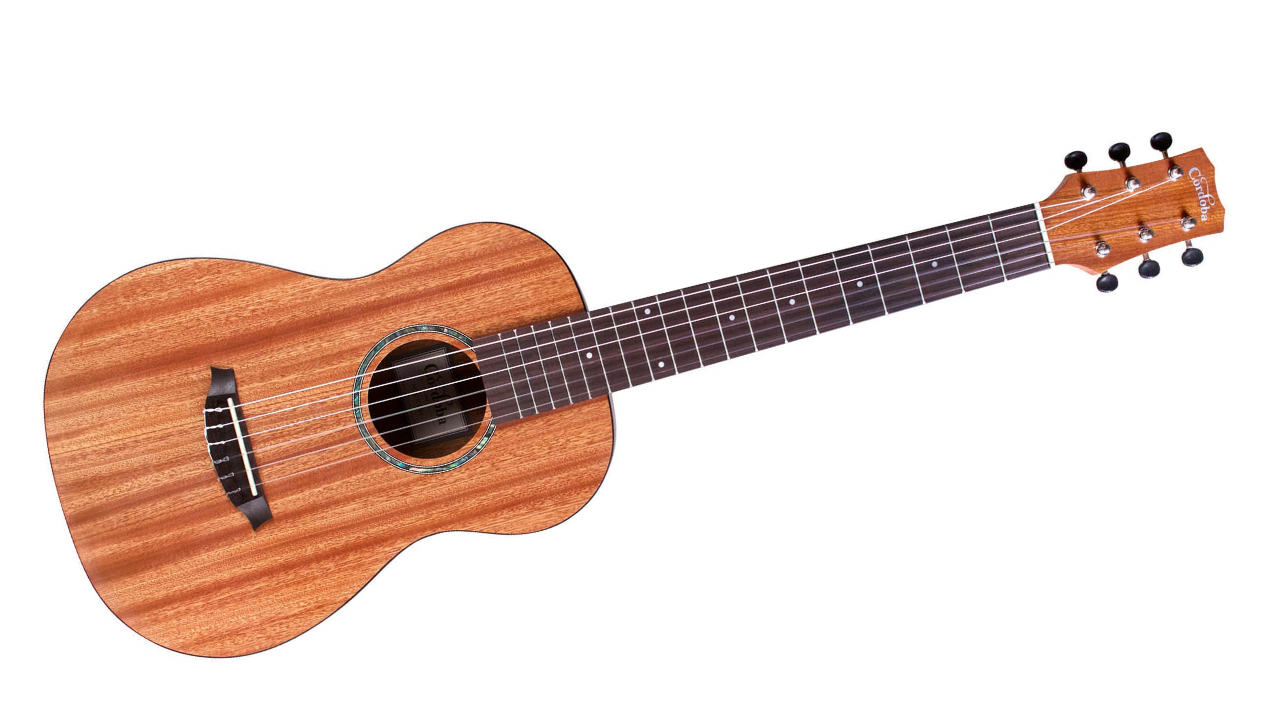
8. Cordoba Mini II Classical
Our expert review:
Specifications
Reasons to buy
Reasons to avoid
For younger players, or those with smaller hands, even a standard classical acoustic might be a daunting proposition. The Cordoba Mini II is the perfect solution though, coming in at a much smaller size than a full sized acoustic and a 3/4 acoustic guitar, yet with all the same functionality and playability.
We were surprised at the sheer level of volume the Cordoba Mini II Classical can produce, while the tone itself is rich with harmonics and warmth. One not to be overlooked, especially for such a low price.
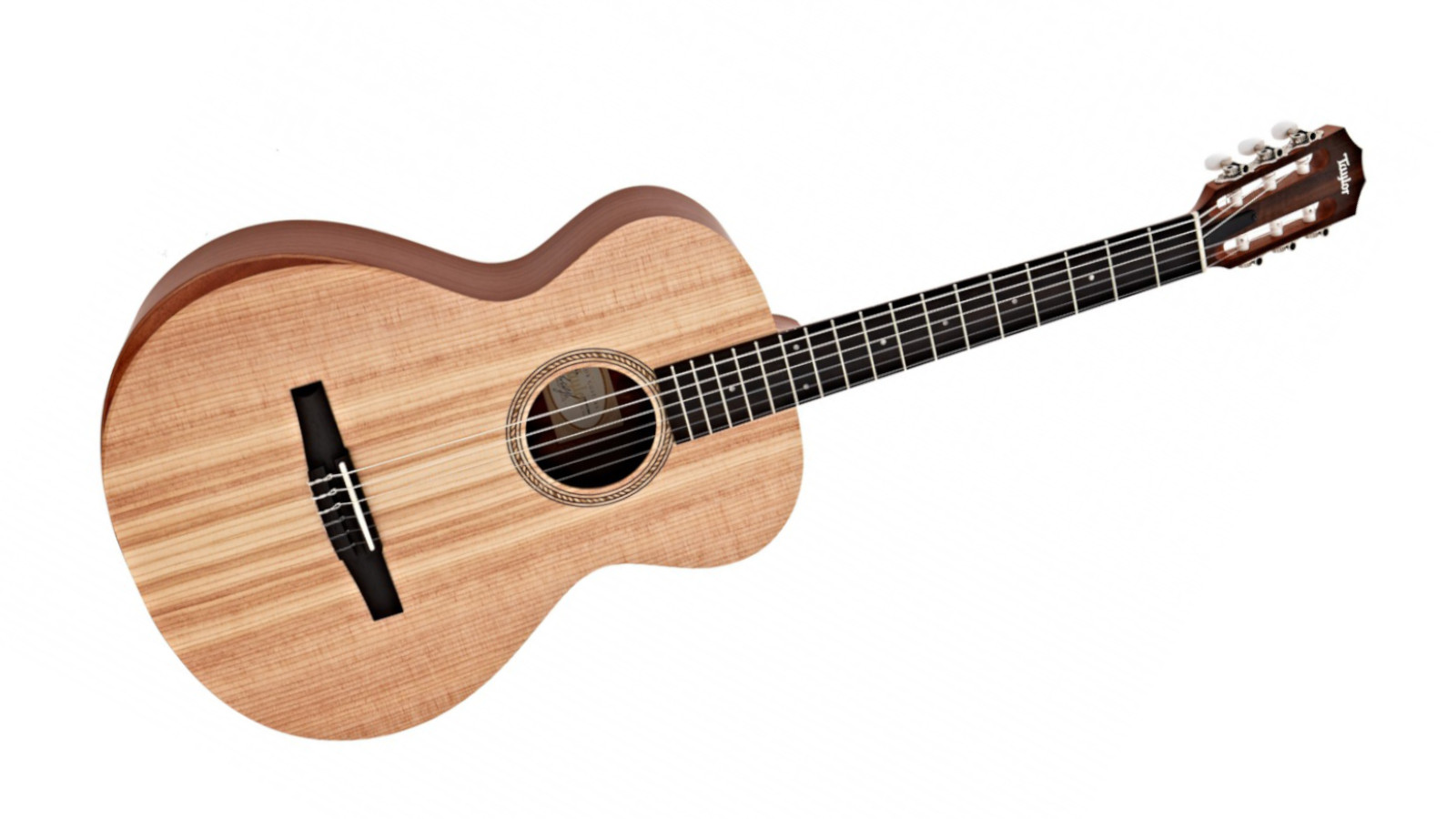
9. Taylor Academy 12-N
Our expert review:
Specifications
Reasons to buy
Reasons to avoid
This sits towards the higher end of what we might normally deem to be the beginner price bracket, but many players do want a really good quality starter guitar. The Taylor Academy was designed to give players, especially beginners, the best guitar possible for the least amount of money. The Taylor Academy 12-N is a dream to play, and sounds incredible thanks to its solid spruce top and layered sapele back and sides. It’s nice and bright with quite a strong attack, and it’s super clear and articulate.
The guitar feels great under the fingers too. It’s easy to get this playing with a low action so that it requires less pressure from your fretting hand. The Grand Concert body shape is comfortable to sit with and is actually fairly compact whilst still retaining a big, full sound. There’s a comfortable armrest on the upper bout of the body which aids in a really enjoyable playing experience. Whether you’re playing fingerstyle, or strumming with a pick, this is absolutely one of the best beginner classical guitars out there.
Best beginner classical guitars: Buying advice
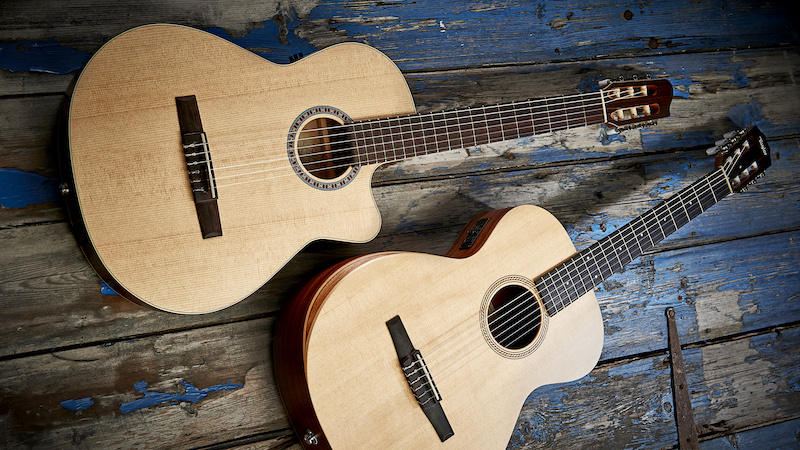
Do I have to play classical music on a classical guitar?
No! If you’re playing classical or Spanish music, then you’re going to want a nylon-strung guitar. However, those just starting out might want something a little easier on the fingers, which is where the best beginner classical guitars come in. While they’re certainly suitable for more traditional styles of music, those wanting to venture into the world of pop, rock, jazz, soul, RnB – pretty much anything really – can still play one of these and get great results.
Steel-string acoustics and electric guitars are fitted with strings that are physically much tougher, so when you’re pressing down on them, they can hurt a little when starting out. Nylon strings are softer so hurt less, which means you can play for longer stretches without your fingers needing a break.
Head over to our guide to the best acoustic guitars for beginners for more steel-string flat-tops.
Which body size is best?
If you’re on the smaller size, or you’re shopping for a child’s guitar, or maybe you just prefer sitting with a more compact instrument, then you might want to consider a smaller guitar. Some of the best beginner classical guitars are available in 3/4 size (or thereabouts), meaning that everything is scaled down. This makes stretching and moving to different positions on the neck a lot easier. Also a smaller guitar body will mean there’s less to get your arm around. Some models might feature a slimmer body too, for exactly this reason.
Which tonewoods are beginner classical guitars made from?
When discussing acoustic instruments, there tends to be a lot of talk about tonewoods, and the best beginner classical guitars are no exception. The wood from which an instrument is made has an impact on what it sounds like. Solid wood vibrates more freely so resonates better and sounds richer. Laminated or layered wood doesn’t quite sound as good but is usually cheaper.
Some of the best beginner classical guitars feature a solid top, with layered back and sides. This is a nice balance between good sound and affordability.
The two most common tops you’ll see here are spruce and cedar. Spruce tends to be brighter sounding, and can project really well. You'll get a good amount of clarity and note separation – it’s also lighter in color so will be different visually. Cedar is often fuller and warmer, or darker sounding. It’s also usually very responsive so will react to whatever your plucking/picking hand is doing, making it a popular choice for beginner guitars.
Why do some classical guitars have a pickup?
Some of the best beginner classical guitars come fitted with a pickup, which means you can plug it into an amp or PA system. So, if you’re thinking that you want to work up to playing gigs or open-mic nights, without having to upgrade your guitar before you do, then consider a model with a built-in pickup. If you’re fairly confident that you don’t need this, and just want to play at home, or take lessons/exams, then you will get plenty of volume without needing a pickup or amp.
- Follow our guide on how to restring a classical guitar
How we choose the best beginner classical guitars for this guide
You can trust Guitar World
Here at Guitar World, we are experts in our field, with many years of playing and product testing between us. We live and breathe everything guitar related, and we draw on this knowledge and experience of using products in live, recording and rehearsal scenarios when selecting the products for our guides.
When choosing what we believe to be the best beginner classical guitars available right now, we combine our hands-on experience, user reviews and testimonies and engage in lengthy discussions with our editorial colleagues to reach a consensus about the top products in any given category.
First and foremost, we are guitarists, and we want other players to find the right product for them. So we take into careful consideration everything from budget to feature set, ease of use and durability to come up with a list of what we can safely say are the best beginner classical guitars on the market right now.
Read more about our rating system, how we choose the gear we feature, and exactly how we test each product.
Related buyer's guides
- Acoustic guitar vs classical guitar: what’s the difference?
- Best acoustic guitars for beginners, at a range of budgets
- Play more comfortably with the best guitars for small hands
- Try something new with one of the best beginner ukuleles
- Stock up on beginner guitar gear essentials and guitar accessories
- The best guitar capos to get started with
All the latest guitar news, interviews, lessons, reviews, deals and more, direct to your inbox!
Chris Corfield is a journalist with over 12 years of experience writing for some of the music world's biggest brands including Orange Amplification, MusicRadar, Guitar World, Total Guitar and Dawsons Music. Chris loves getting nerdy about everything from guitar gear and synths, to microphones and music production hardware.

